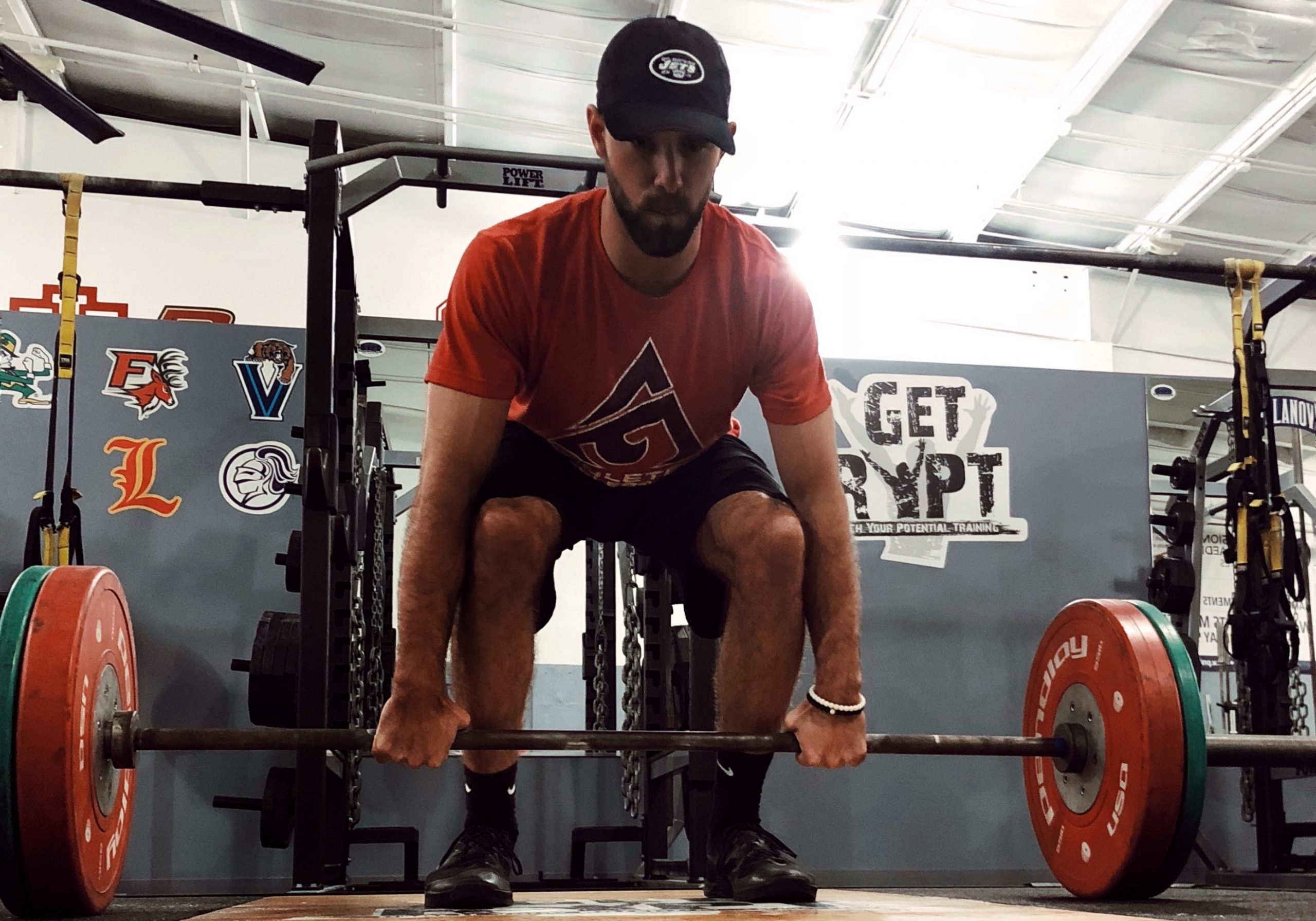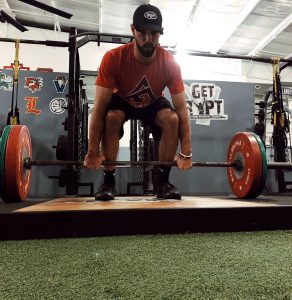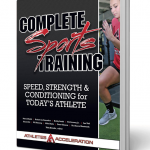Sport Specific Vs. Athlete Specific
Pat Livesey Jr.
As a private sector sports performance coach, talking with parents is a daily part of the job. It kicks off with the parent talking about their athlete, the strengths and weaknesses that they notice, and what they want to see worked on during training. Understanding that every parent wants the best for their kids, it is our job to give them a sense of comfort that our facility will be the best fit for them to develop into the star athlete they were born to be.
“I want my son/daughter to do _________ specific training.”
Whatever sport they play, parents are continuously asking for sports specific training, but what does that really even mean? I wanted to talk about what people think “sports specific training” means, and what I feel like it should actually entail. I believe that it is important for strength and conditioning coaches to adapt an “athlete specific” ideology, rather than the sports specific mindset that is portrayed all over.
Working with a younger generation of athletes who are so focused on one single sport instead of developing into multi-sport athletes, we are hitting an epidemic of sport specific injuries. Parents are getting lost in the importance of “off-season training” and the addition of off-season sports camps/practices are becoming more and more common. It’s called off-season for a reason.
As a result, we are seeing more and more injuries specific to the sports that they play. Soccer/basketball athlete’s tearing their ACLs, and baseball/softball athlete’s with rotator cuff issues.
As strength and conditioning coaches, we need to educate athletes and parents that it is important to put down the ball, stick, or glove every once in a while and focus on developing some of the crucial skill sets that are required of athletes who want to play at the next level. We need to teach these athletes proper movement patterns during movement, and improve foundational strength and proper technique in the weight room. The process needs to be slowed down and “slow-cooked” to ensure proper development.
This brings me back to the point of sport specific vs. athlete specific and trying to understand what sports specific means through the eyes of…
- The Athlete
- The Parent
- The Sport Coach
- The Strength Coach
For the sake of this piece I want to use an example of a high school/college level athlete who plays basketball…
- What does sports specific training mean to The Athlete?
Honestly, the youth generation is going to be impacted by what they see on social media, whether we like it or not. Whichever coach/trainer has the most views and likes on Instagram, they are going to produce the next ‘best’ drill set to do. Dribbling a basketball through some agility hurdles, driving to the hoop and doing 5 pushups after a missed layup. Implementing agility and speed components, as well as a strength exercise at the end, they are covering all aspects of training within one drill… BRILLIANT. (insert eye roll). Athletes are misguided. It is our job to educate them on the importance of training off the court/field and teach them proper techniques.
- What does sports specific mean to The Parent?
Parents want their kids doing the hardest, most progressed movements possible for any athlete that plays the same sport. Let’s take LeBron James performing repeat jumps on a vertimax system, for example. This drill looks great when one of the best athletes in the world performs it. But what happens when you attach a 14 year old on the same vertimax and he/she tries to perform the same drill that LeBron did?… Recipe for disaster. Most parents won’t understand and this is when you ask them politely to wait in the lobby until the session is over. They’ll understand. If they don’t, they wouldn’t have hired you.
- What does sports specific mean to The Sports Coach?
I don’t want to categorize all “sports coaches” in the same group, because I have seen the good and the bad. Most sports coaches just want results as fast as possible. Week 1, Day 1 of training and they want Box Depth Drops into Repeat Hurdle Jumps into a Full Court Sprint with a layup at the end. No mechanics, no progressions/regressions, just making them sweat and work hard, hoping they are still ready to perform at a high level for the next game, which is probably tomorrow. (insert head shake). Most Sports coaches are just focused on keeping everyone busy and working hard. If you have ever read Joel Jamieson’s Ultimate MMA Conditioning, you know that he proves that it’s not about how much work you do, but instead that the work has a purpose.
- What does sports specific mean to The Strength Coach?
Here’s the good stuff… when considering sport specific vs. athlete specific, ‘sport specific’ is the wrong word to use. Plain and Simple.
The word needs to be ATHLETE specific. When I refer to my professional title, I say Sports Performance Coach or Strength & Conditioning Coach. There is no Soccer, Basketball, Baseball, Lacrosse, etc. within my title, nor should there be.
My job is to train the athletes to have better running mechanics, better jumping/landing mechanics, and to develop strength/power in the weight room, all without using any sports equipment. If an athlete becomes faster, stronger, and more efficient on the field, they are without a doubt going to become a better athlete. Our goal is to help the athlete prepare for their sport, not to replicate it.
Now, every good business model is developed to attract clients and in turn, maintain those same clients by keeping them happy. So how can we keep the athlete’s engaged, keep the parents happy, and stay true to this “strength and conditioning coach” title that we own? How can we incorporate athlete specific training and relate it to specific athletes? The past few off-season’s I have had the pleasure of training some professional athletes who have widely different roles when it comes to what they’re expected to do on the field.
A couple ways that I have found to be able to create a specificity to sport is to relate the drills to distances and directions on a field. For example, when training an athlete who plays baseball, any linear speed drill could be done with a distance of 90ft. The distance between bases is 90ft on a baseball diamond, so by simply matching up that distance, it brings a sense of comfort to the athlete performing the drill.
To compare with another sport, when training a football athlete who plays defensive line, I would not have him do linear speed drills for 90 ft, simply because it does not match up with his needs. Instead, performing short bursts of acceleration and technique in the 3-point stance trumps importance. At the end of the day, both athletes are working linear speed, however the distances and starting positions are now “specific” to their sport.
While certain sports possess specific skills that make one player more “athletic” than another (i.e Vertical Jump for Basketball), each of these skills can and will make an athlete better. If you jump higher, you will be better able to out rebound in basketball, reach a header in soccer, catch a ball in football. If you run faster, you will be able to get to a ball before the opponent, create separation downfield, or track a ball over your head.
This is why it is crucial for us as strength and conditioning coaches to stay true to our job title. Yes, there are coaches out there who do skills training, and they do a very good job. Pairing the two training styles may work great for some athletes, but it is so important to develop simple movement patterns and foundational strength before asking them to perform advanced movements. As a strength and conditioning coach, my job is to make these athletes more athletic, which in turn will make them better at their sports.
Athletes Acceleration’s brand new book, Complete Sports Training, is now available! Grab your copy today!
About the Author
Pat Livesy, Jr. joined the RYPT team as an intern in 2015 after graduating from the University of Louisville. After earning a degree in Exercise Science from the University of Louisville, Pat went on to earn a Master’s Degree in Exercises Science with a concentration in Sports Performance & Injury Prevention from California University of Pennsylvania.
During his time at the University of Louisville, Pat immersed himself in both the educational and philanthropic opportunities available. After graduating, Pat sought additional experience in the field of sports performance, working as an intern for Seton Hall University Strength and Conditioning (Winter 2015) and RYPT (Spring-Summer 2015).
Pat was promoted to the RYPT staff following his internship and is now one of the Sports performance coaches and the coordinator of Adult RYPT.





0 Comments for “Sport Specific Vs. Athlete Specific”